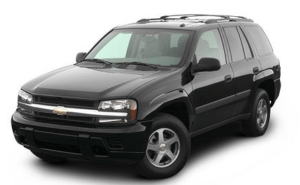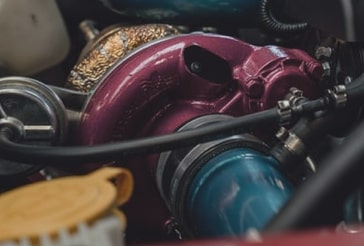A very common problem that affects all vehicles (including the Chevy Trailblazer) is blue smoke coming from the exhaust. Reasons for blue exhaust smoke include bad valve seals, valve train wear in general, the PCV valve, burning transmission fluid and more.
Blue smoke indicates that your Trailblazer’s engine is burning oil. The question is how is oil getting into the combustion chamber?
Blue Smoke From Exhaust Causes: Chevy Trailblazer
Here are the most common causes of blue smoke coming from your Trailblazer’s exhaust:
Valve Seals Worn Out
Your Chevy Trailblazer’s valves let both air and fuel into the combustion chamber. They are lubricated like the rest of the motor. Valve seals are utilized to keep the oil from riding down the valve stem and into the combustion chamber while the valves are letting air and fuel into the cylinder.
If your Trailblazer’s valves are worn, you’ll see a hint of blue smoke while the engine is running. But, it’ll be at its worst when the engine is starting up, as oil has had time to seep past the valve seals while it’s sitting.
Piston Rings
Each piston in the vehicle’s engine is responsible for compressing the air and fuel mixture into a smaller and smaller space before the spark plug fires.
The gap between the cylinder wall and the piston is so tiny that you can’t get a piece of paper in-between them. On top of this, piston rings are wrapped around the piston for an even tighter fit. This keep oil out of your Trailblazer’s combustion chamber.
When the piston rings fail, oil passes through them and into the combustion chamber, and you’ll get blue smoke from your exhaust. This is most common in high mileage engines and is a sign that the bottom end has worn out.
PCV Valve
Your Trailblazer’s PCV system is responsible for taking the pressure that builds up in the oil pan and moving it to the intake side of the engine. It opens and closes, which keeps the intake free of oil. If it stays open, oil will build up in the intake, and you’ll end up with blue smoke coming from the exhaust as this oil is burnt.
Turbocharger (turbocharged engines only)
As auto manufacturers constantly push for better fuel economy, turbochargers have been finding their way into regular, everyday vehicles. When a turbocharger goes bad, it will allow oil to get sucked into the combustion chamber. Usually it’ll be a big plume of blue smoke as this happens.
Bad Glow Plug (Diesel Engines Only)
Glow plugs warm up the engine enough for the combustion of diesel fuel when a diesel engine is cold. If one of the plugs has gone bad, it’s going to cause blue smoke until the motor has warmed all the way up.
Chevy Trailblazer Blue Smoke Diagnosis
Blue smoke is different than white or black smoke. They are caused by different engine problems. When you see blue smoke, you need to find out how oil is getting into your Trailblazer’s combustion chamber.
PCV
The first thing that you’re going to want to do is check the PCV valve. It’s far and away the easiest thing to check. Here is a really great video from YouTube that shows exactly how you would go about doing so.
Glow Plugs or Turbo Vehicles
After checking the PCV valve, it’s time to move onto the turbo (turbocharged vehicles only) or glow plugs (diesel only) and see if either of them are bad.
How to test glow plugs (YouTube)
Engine
Once we are sure that all of the easier stuff to check is not causing the blue smoke, it’s time to turn to the inside of the engine.
Valve Seals
You’ll want to check the valve seals. There are ways to get a pretty good idea if they are bad without ever cranking the engine over.
Bad Valve Seal Symptoms (ItStillRuns)
Piston Rings
Piston rings are tough (or impossible) to get to without pulling the engine. You can learn a lot about what is going on with the valves, valve seals, and piston rings by doing a compression test. When done right, this can help you tell if the Trailblazer’s piston rings are worn.
Compression Test: How To (PopularMechanics)
Conclusion: Blue Exhaust Smoke Chevy Trailblazer
It can be tough trying to track down why you may have blue smoke from your exhaust. With a little patience, you can do it. If there is anything you’d like to add, please leave a comment below.



